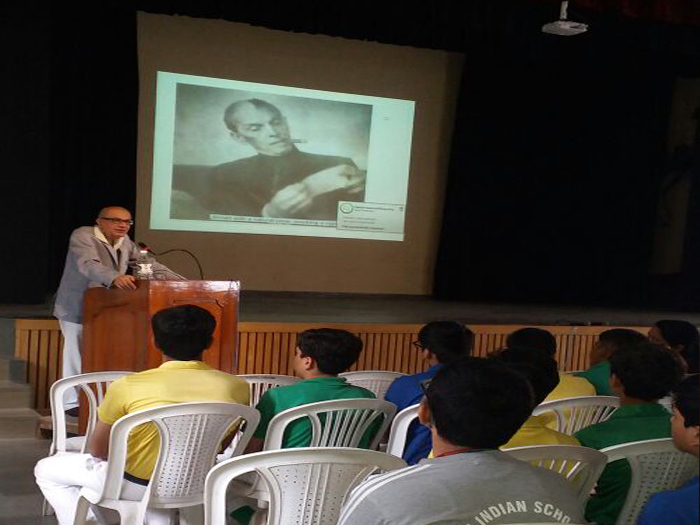In conversation with Shri Prafull Goradia about Quaid-e-Azam, Mohammad Ali Jinnah
In the wake of the Indian armys surgical strike on the terror pads in POK, Pakistan and India stand on the edge of an abyss into may plunge the world. Our chairman, Mr. Prafull Goradia on 29th September 2016, as a part of his student enrichment endeavour, gave a very timely talk to the students of class X on the road traversed by Mohammad Ali Jinnah, from being an ambassador of Hindu-Muslim unity to the Quaid -e-Azam of Pakistan!
Indias independence from the British Raj was beyond doubt a fractured freedom. Independence came to India and Pakistan in 1947, but was accompanied by a cataclysmically violent and pain-filled breakup of the land and its people. What was left behind was bitterness, a deeply wounding trauma which continues to torment the psyches of the successor countries even today. And Jinnah, the Moses of the muslims stands as the chief accused for the mayhem.
Students had a plethora of questionsWhy partition? How partition? Was it a collective human folly that created Pakistan? Could Jinnah achieve that long sought after dream of the muslims for a separate state? How did congressmen help Jinnah in the surgical division of India and its people? Did the birth of Pakistan conclusively prove Jinnahs thesis? Or was there actually a rejection of this thesis in the emergence of Bangladesh?
[gallery link="file"]
Mr. Goradia with his visual and spoken historiography could answer a number of questions and still create a background for more.
Some fifty odd miles from Rajkot, the birth place of Indias father of the nation, Mahatma Gandhi, lies Paneli, the ancestral village of the father of Pakistan, Mohammad Ali Jinnah. His grandfather Poonjabhai was a Khoja musilm, a convert from the Hindu Lohana caste. Jenabhai, Jinnahs father moved to Karachi for wider prospects and eventually his association with Frederick LeighCroft proved to be fruitful.
Mr. Goradia with a visual presentation, equipped the students with the educational journey of Jinnah from the Sindh Madarassah-tul-Islam to The Church Mission School of Karachi and finally to Lincolns Inn, after which he came to be among the best legal luminaries at the Bombay Bar. The pictures from Jinnahs family album of Poonja Jenahbhai, showcase Jinnahs three sisters Maryam, Fatima and Shireen, Jinnahs brother Ahmed Ali Jinnah and his wife Emmy. Mohammad Ali Jinnahs second wife, daughter of Parsi industrialist and Jinnahs friend, Sir Dinshaw Petit. Dina Wadia, Jinnahs only daughter and wife of Neville Wadia, mother of Nusli Wadia and grandmother of Ness Wadia and Jeh Wadia. The images gave a rare glimpse of Jinnahs personal life, apart from his so called political manoeuvres.
Mohammad Ali Jinnah on his return from London joined the Indian National Movement and was soon hailed as an ambassador of Hindu Muslim unity by Gopal Krishan Gokhale and Sarojini Naidu. However, with Gandhiji entering national politics, Jinnahs ethos started changing, though not at once and this was not just because of the formers proximity to Nehru but to Jinnah, Gandhi was always a rival, a poseur, a fake and a demagogue. Jinnah thought that since Gandhi was the sole spokesperson of the Hindus then why shouldnt there be one for the Muslims? Jinnah went to London in 1930 as a disillusioned man who could not bring any change in the Indian political scenario. Soon though, a vacuum was created among the muslim community and they began looking for a powerhouse.
Jinnah was invited back but initially he refused. However in 1933, Liaquat Ali Khan and his vivacious wife called on him at his house in Hampstead Heath. They were finally successful in drawing him back. This was visible in the photographs shown to the students and soon events like the election results of 1937, the Pakistan Resolution, Direct Action Day, Calcutta Killing made partition a reality.
Mr. Goradia also brought to light that while leaving India for Karachi on 7th August 1947, Jinnah appealed to both Hindus and Muslims to bury the past and wished India success and prosperity. He also held that the minorities in Pakistan will be protected and be safe as Pakistan would be a secular country. However, he was short of time and could not see his vision become a reality before he died.
Ms. Charu Bhatnagar.













